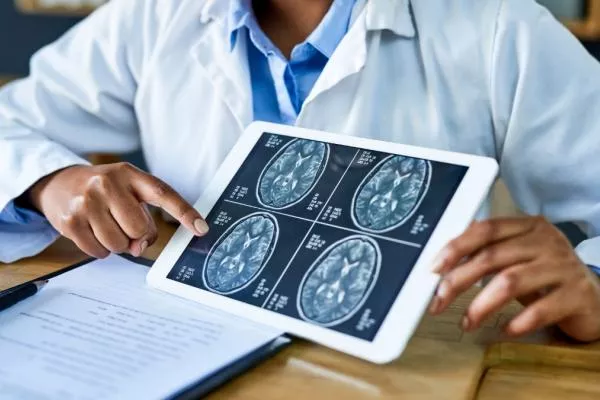Brain tumors include diverse group of neoplasms arising from cells within brain or from systemic cancers spreading to brain. Brain tumors can produce symptoms due to mass effect leading to compression of surrounding structures or due to increased intracranial pressure.
Common symptoms of brain tumor are
- Headache: Tumor related headache can be dull and constant or throbbing. Severity tend to increase over time and worsening of headache occur at night or early morning hours and may be associated with vomiting.
- Seizures: Seizures can be focal or generalized
- Weakness and or numbness/sensory loss: Weakness of one side of body or weakness of face and limbs can occur due to brain tumor. Weakness may or may not be associated with sensory loss.
- Speech abnormalities: Brain tumor can produce difficulty in understanding of speech or production of speech.
- Cognitive dysfunction: Usually these deficits are subtle to begin with. Patient often complain of low energy, fatigue, loss of interest in day to day activities, loss of spontaneity. Later on may progress to have memory loss and executive dysfunction.
Effect of brain tumors on cognitive function: Brain tumors can cause cognitive dysfunction due gto local damage to surrounding structures concerned with cognition as well as disruption of cognitive networks. Attention, memory and executive function are most frequently affected domains. Along with tumors, treatment for tumors like surgery, radiotherapy and medicines used can also cause cognitive dysfunction leading to deteriorating quality of life.
Steps to reduce cognitive dysfunction
- Cognitive assessment: Cognitive assessment before and after surgery to compare the loss of cognitive functions.
- Surgery modification: Surgery sufficient to remove the tumor but to preserve the normal brain tissue as much as possible can be tried.
- Radiotherapy: Less invasive radiotherapy techniques like limited fraction dose, stereotactic radiotherapy can be undertaken instead of whole brain radiotherapy whenever possible
- Targeted therapy: therapies that specifically target tumor cells is less likely to damage normal brain tissue.
- Cognitive rehabilitation: A therapy to patients suffering from cognitive dysfunction during or after tumor treatment.





